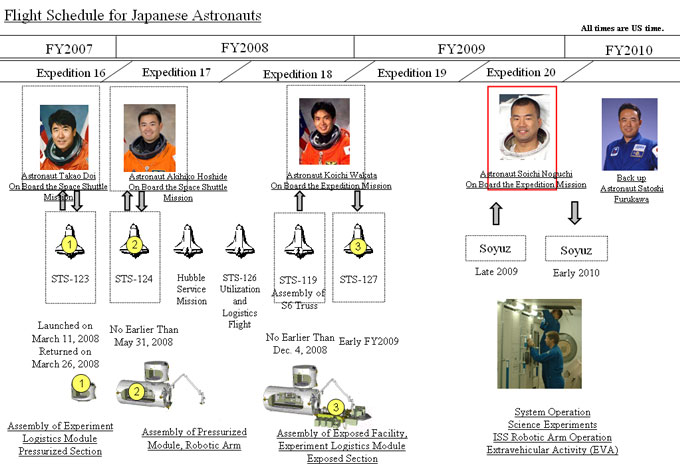Announcement of Japanese Expedition Crew to the International Space Station (ISS)
Japan Aerospace Exploration Agency (JAXA)
Space organizations in Canada, the European Union, Japan, Russia and the United States have agreed on the following schedule and members for the 20th Expedition Crew that will stay on the International Space Station (ISS).
We are pleased to note that Astronaut Soichi Noguchi of the Japan Aerospace Exploration Agency (JAXA) was selected as a prime member of the Expedition 20 Crew and that Astronaut Satoshi Furukawa was selected as his backup.
Astronaut Noguchi will conduct mainly space utilization activities such as Japan's scientific experiments in the ISS where six crew members will be staying by his flight.
| Expected Stay on the ISS: | Late 2009 to early 2010 |
| Expected Mission Duration: | 6 months (Launched and returned by Soyuz launch vehicle) |
| Expected Activities on the ISS: | |
| Conduct system operation and science experiments in the ISS modules including Kibo, ISS robotic arm operation, and Extravehicular Activities (EVA) as an ISS Flight Engineer. |
|
| Preparation for flight: | Training for operation and science experiments in each ISS element; training for flying aboard a Soyuz. |
| References: | Brief personal histories of Astronaut Soichi Noguchi and Astronaut Satoshi Furukawa Flight Schedule for the Japanese Astronauts JAXA President's Remarks |
| Reference Links: | ISS Kibo Information Center http://iss.jaxa.jp/ |
|
|
 |
Soichi Noguchi Japan Aerospace Exploration Agency (JAXA) Astronaut (43 years old as of May 2008) |
1965 |
Born in Yokoyama, Kanagawa Prefecture. |
| March 1989 |
Received a bachelor of engineering degree in aeronautical engineering from the University of Tokyo. |
| March 1991 |
Received a master of engineering degree in aeronautical engineering from the University of Tokyo. |
| April 1991 |
Joined Ishikawajima-Harima Heavy Industry Co., Ltd. |
| June 1996 |
Selected as an astronaut candidate. |
| August 1996 |
Started astronaut training. |
| April 1998 |
Certified as a Mission Specialist (MS). |
| April 2001 |
Assigned to the MS for STS-114 mission. |
| July 26 thru August 9, 2005 |
Flew aboard Space Shuttle Discovery and served as the first Japanese leader for extravehicular activities (EVA). He performed three EVAs. |
| February 2007 |
Assigned as back-up for Astronaut Wakata who was selected as an ISS expedition crew member of Expedition-18. Currently in training. |
 |
Satoshi Furukawa Japan Aerospace Exploration Agency (JAXA) Astronaut (44 years old as of May 2008) |
1964 |
Born in Yokohama, Kanagawa Prefecture. |
| March 1989 | Received a Doctorate in Medicine from the University of Tokyo. |
| 2000 | Received a Doctor of Philosophy degree in Medical Science from the University of Tokyo. |
| 1989 to 1999 | Worked in the First Department of Surgery at the University of Tokyo Hospital. |
| 1989 to 1994 | Also worked in the Department of Anesthesiology and the Department of Surgery of other hospitals to engage in clinical study of the digestive system. |
| February 1999 | Selected as an astronaut candidate along with Akihiko Hoshide and Naoko Yamazaki (then Sumino). |
| April 1999 | Started training. |
| January 2001 | Certified as an astronaut. |
| April 2001
|
Participated in the ISS Advanced Training, which is supported by the ISS member organizations for astronauts who are expected to work on board the ISS. |
| May 2004 | Completed Soyuz-TMA Flight Engineer-1 training. |
| February 2006 | Certified as Mission Specialist (MS). |
Selection of Japanese Astronaut as Expedition Crew Member for Kibo
Today, I was very delighted to hear that JAXA Astronaut Soichi Noguchi was selected as a prime expedition crew member for the Japanese Experiment Module "Kibo" and that JAXA Astronaut Satoshi Furukawa was selected as his backup. Kibo has been developed by JAXA as part of the International Space Station (ISS).
Astronaut Noguchi is expected to engage in system operations and experiment operations of ISS facilities developed by the ISS partners, including our Kibo. This will be his second visit to the ISS.
I firmly believe that Astronaut Noguchi can succeed in his mission as the second Japanese expedition crew member following Astronaut Wakata by making best use of his experience of the STS-114 flight and training as a backup for Astronaut Wakata.
With two expedition crew members, Astronaut Wakata and Astronaut Noguchi, Japan is now steadily accumulating experience and achievements in manned space activities to improve our technology and expand our knowledge. More Japanese astronauts are planned to regularly stay at the ISS as expedition crew members; therefore, I believe our manned space activities will be more widely known among the Japanese public.
I would like to express my deepest gratitude to NASA and all other domestic and overseas parties and people who supported this selection.
Thank you very much.
President of JAXA
